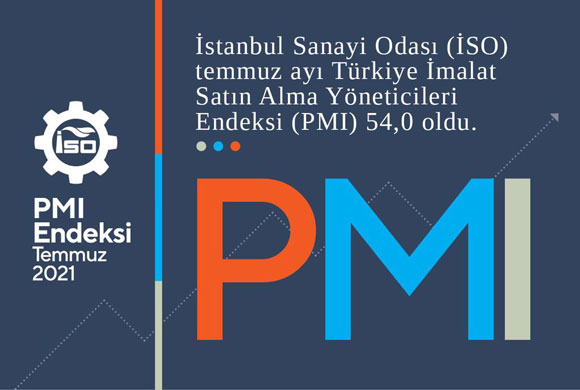News
July 2021 Report of ICI Türkiye Manufacturing PMI and Türkiye Sector PMI Released
- 02.08.2021
- News

The headline PMI of the Istanbul Chamber of Industry (ICI) Türkiye Manufacturing PMI survey, which is the fastest and reliable reference accepted in manufacturing industry performance of the economic growth, rose to 54.0 in July. The latest survey data signalled a solid improvement in business conditions, and one that was the most marked since January. The loosening of COVID-19 restrictions helped lead to an improvement in customer demand in July. The rate of expansion was the fastest since August 2020. New export orders increased even more quickly than total new work as international demand strengthened.
The latest PMI® survey data from Istanbul Chamber of Industry indicated that the loosening of COVID-19 restrictions in Türkiye had a positive impact on demand and production in the manufacturing sector during July. Half of the 10 monitored sectors increased their output volume, with the clothing and leather products sector continued to have the highest growth rate. Most of the sectors posted a rise in employment, with the basic metals recording the sharpest rise. Meanwhile, some sectors continued to have difficulties amid sharp price increases, supply chain disruptions and weak demands.
The July 2021 period of Istanbul Chamber of Industry (ISO) Türkiye Manufacturing PMI (Purchasing Managers’ Index) survey, which is the fastest and reliable reference accepted in manufacturing industry performance of the economic growth was announced. According to the results of the survey where any figure greater than 50.0 indicates overall improvement of the sector, the headline PMI rose to 51.3 in July following a reading of 51.3 in June. The latest survey data signalled a solid improvement in business conditions, and one that was the most marked since January.
The recent loosening of COVID-19 restrictions helped improving customer demand in July as new orders continued to rise solidly. The rate of expansion was the fastest since August 2020. New export orders increased even more quickly than total new work as international demand strengthened. Removal of COVID-19 restrictions and improving customer demand had been behind the rise in production, which was for the second successive month. The rate of growth accelerated compared to June, reaching a solid pace that was the fastest of the last nine months. While manufacturers were generally able to keep on top of workloads in July, there was some evidence that new order growth had placed some pressure on capacity. Backlogs of work were broadly unchanged. Firms responded to greater workloads by expanding their staffing levels and purchasing activity, in both cases at stronger rates than in June. Efforts to secure inputs were hampered by ongoing disruption to supply chains, however. Panelists reported that problems with shipping containers and difficulties sourcing raw materials had led their suppliers’ delivery times to lengthen. The rate of input cost inflation accelerated for the third month running, and was substantial. Respondents linked higher input prices to weakness in Turkish Lira and increases in raw material costs. In turn, firms raised their own selling prices at a marked pace that was stronger than the series average, albeit softer than in the previous month.
Commenting on the Istanbul Chamber of Industry Türkiye Manufacturing PMI survey data, Andrew Harker, Economics Director at IHS Markit, said:
“Latest PMI data pointed to a ramping up of output and new orders across the manufacturing sector as firms benefited from the loosening of COVID-19 restrictions and stronger customer demand. Firms showed themselves able to rebound quickly last year and appear to be on track to do so again, with sharper increases in employment and purchasing activity helping them to deal with rising workloads. With virus cases on the rise again, however, there may be concerns that growth plans could be hindered again in the months ahead.”
A complicated outlook in the sectors
The latest PMI® survey data from Istanbul Chamber of Industry indicated that the loosening of COVID-19 restrictions in Türkiye had a positive impact on demand and production in the manufacturing sector during July. Meanwhile, some sectors continued to have difficulties amid sharp price increases, supply chain problems and weak demands.
Half of the 10 monitored sectors increased their output volume. The clothing and leather products sector continued to have the highest growth rate. The loosening of COVID-19 restrictions contributed to the rebound in Food products, Electronic and electrical equipment sector, Chemicals, plastics and rubber sector, and Wooden and paper products sector. Land and sea vehicles posted the sharpest decline in slowdown in production. Similarly, five of the ten sectors marked expansion in new orders with the food products sector leading with the highest expansion, a record high since January 2016. The food products sector also saw sharp increase in new export orders. All ten categories saw suppliers' delivery times lengthen. However, disruption in suppliers’ performance was moderate compared to June in most of the sectors. The most severe delays in deliveries were noted in the chemicals, plastics and rubber sector. The disruption in supply chain caused a significant acceleration in input costs inflation of the chemicals, plastics and rubber manufacturers. The strongest cost pressure was seen in land and sea vehicles firms with a new record high inflation rate. All of the sectors noted significant increases in selling prices with the strong increases in input costs in July. The basic metals sector posted the sharpest increase in finished goods, while the textiles sector managed the lowest increase, trying to increase new orders against stationary demand. Supply chain disruptions caused a rise in backlogs of many sectors, primarily the food products sector. Most of the sectors saw increase in employment. But not in all of the sectors like in the previous months and the number of sectors expanding their staffing level. The strongest expansion in employment was in the basic metals sector. Three sectors lowered their staffing level, with the sharpest drop in non-metallic mineral products sector.